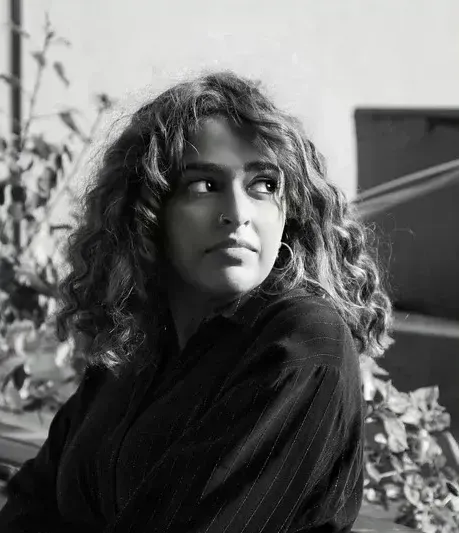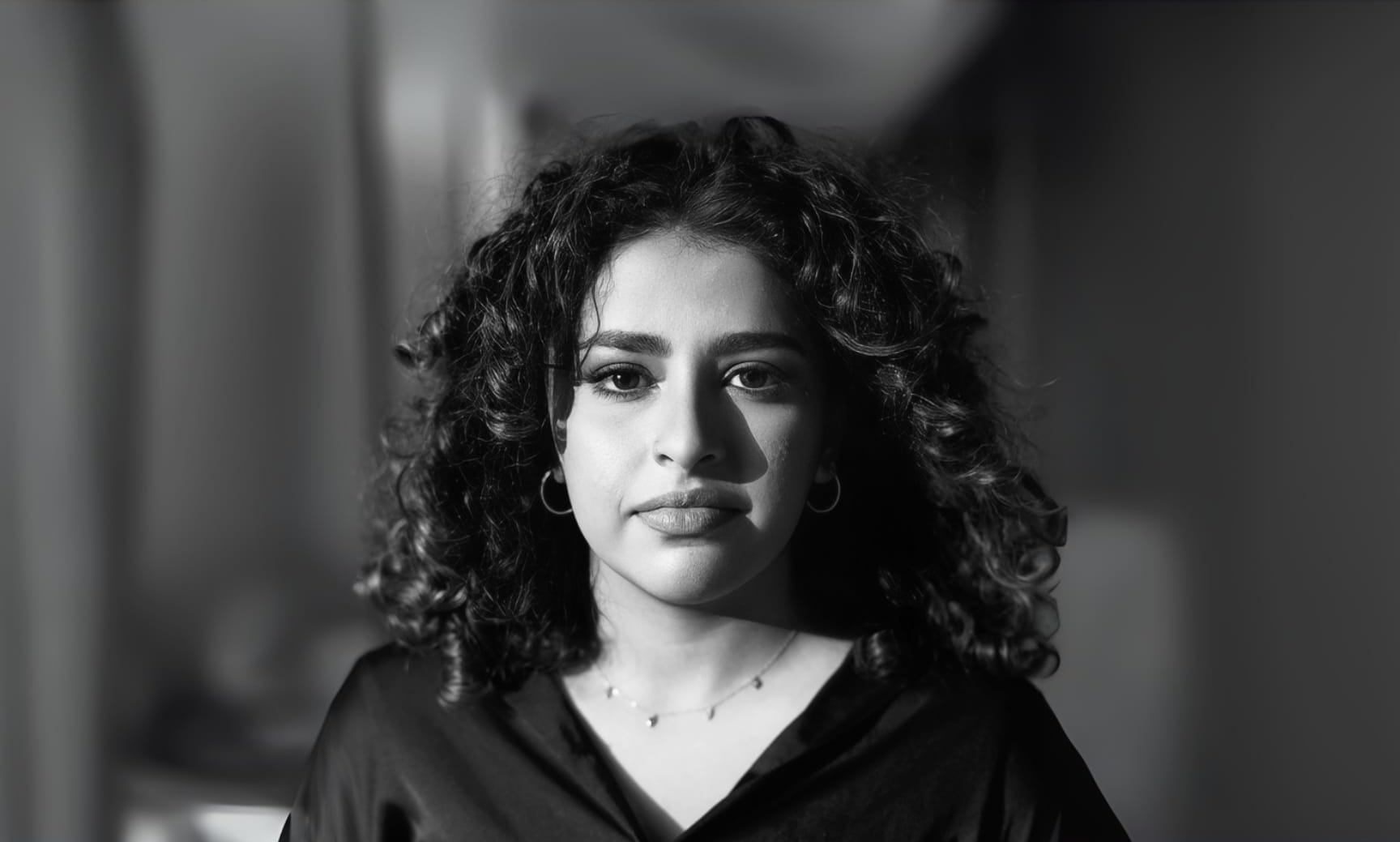Some filmmakers build worlds. Sara Mesfer builds truth. The Jeddah-based director and writer came to international attention with The Girls Who Burned the Night, a short that first screened at the Cairo International Film Festival and later reached audiences at Palm Springs ShortFest. The film resonated because it felt lived-in: two sisters, one night, a quiet storm of anger and want. Since then, Sara has stayed focused on what drew her to cinema in the first place: real people, real feelings, and a process that never fakes it.
Today, she’s developing her first solo feature, Habibi And I In Eden, while keeping her craft grounded in honesty.
Foundations: Craft Before Hype
Sara is Saudi, based in Saudi Arabia, and trained in the craft. She holds a Bachelor’s degree in Cinematic Art from Effat University. But the classroom was only one part of her education. In 2016, she joined a circle of independent filmmakers and started making work across forms, shorts and features, testing roles, styles, and methods. Some of these projects traveled to local and international festivals; all of them sharpened her instincts.
Those years came with industry miles, not just film-school theory. She produced and directed at VICE Video. During summer stretches, she worked as an assistant director on commercials and music videos, learning pace, blocking, and on-set problem-solving. On television sets, she served as second assistant director and script supervisor, two jobs that teach timing, continuity, and discipline under pressure. That breadth shows on screen. Her films feel tightly held because she understands the machinery behind every shot.

“I make the films that I want to see… first for myself, to express myself.” — Sara Mesfer
A Childhood of Scenes
Ask Sara how she became a filmmaker and she won’t give you a neat origin story. She’ll say she has always “seen life as scenes”, fragments that didn’t fully connect until she found cinema. As a student and then as a young director in Jeddah, she learned to translate those fragments into scripts, then into performances, then into films that feel immediate.
Early on, she realized her best route to authenticity was simple: get personal. Draft after draft, she writes from a feeling: girlhood, anger, the ache of wanting something “very reachable yet very far”, and lets the story separate from her as it evolves. “The first treatment and the last draft look nothing alike,” she says with a half-smile. That’s not chaos. That’s craft. The personal spark remains; the story becomes its own thing.
The Producer Who Became a Director (and Kept Producing)
Before audiences knew her as a director, Sara was winning recognition as a producer. The first short she produced, “Sadeya Left Sultan,” won the Jury Prize at the Saudi Film Festival in 2018 and screened at the Malmö Arab Film Festival and other regional showcases. Producing sharpened her feel for scale, what a story really needs, and what it doesn’t.
That pragmatism carried into her next steps. In 2019, Sara wrote and produced “Quareer, Chapter Three” as part of Quareer, a collective feature that traces five stages of a woman’s life in Saudi Arabia. The collaboration mattered: it placed her inside a cohort of women filmmakers building a new canon together, not waiting for permission.
The same year, she wrote and directed “The Girls Who Burned the Night.” It’s the calling card: precise, intimate, and emotionally exact. The film earned a Special Mention at Palm Springs ShortFest (2021) and a Special Mention from the jury at Cairo International Film Festival’s 42nd edition. Recognition is nice; the real win is clarity. With Girls, Sara cemented a voice: actor-led scenes, spare dialogue, and stakes that feel close to the skin.
Her momentum continued with “Al Dabah,” her segment in Becoming, an omnibus feature by four Saudi women directors made with support from the Red Sea Film Festival Foundation. Different projects, same principle: realism first.

Writing as Excavation
For Sara, writing is not a straight line. It’s an excavation. She begins close to the bone. Memories, fragments, the inner child that still bristles, and gives herself permission to reshape. A writing course during the pandemic sharpened this instinct: the more personal a draft is, the more an audience can feel what the author is trying to say. Paradoxically, as the drafts advance, the story detaches from her and stands alone. That detachment is clarity. “It’s a personal feeling,” she says. “The story is its own thing.”
This is why her films feel both intimate and generous. They start with her, then become ours.

Making Films Here, Not Just About Here
Logistics are improving, but anyone working in Saudi production knows the puzzle: permits, casting, crew availability, and timelines that can bend at short notice. Sara has done the miles inside that reality. The important part is that she keeps the standard high. She values the expanding local circuit, the ability to premiere at home, to speak with audiences who know the textures she’s portraying, and she brings that same seriousness to international screenings.
A growing industry brings a new temptation: to go big before you go true. Sara resists that. Detail comes first. The rest follows.

Next Step: Habibi And I In Eden
As she writes and preps her first solo feature, Sara isn’t changing course. Habibi And I In Eden carries the DNA that defines her shorts: nocturnal tension, intimacy, a young woman’s secret that threatens to change everything. What matters for her is not just what happens but how it feels when it happens.
Expect the same attention to casting and speech. Expect a camera that stays close enough to register a breath, a flinch, a half-decision. Expect a story about agency, about a character who “only makes sense to herself,” and how that sparks friction with the world around her. If Sara’s previous work is a guide, the film won’t chase a loud twist. It will chase a true one.
Why Her Voice Matters Now
Saudi cinema is scaling fast. New festivals, new grants, new screens, new audiences. In young industries, it’s tempting to go flashy. Yet Sara goes honest. She is part of a visible wave of women directors who aren’t asking permission to tell complex female interiority on screen. Their work isn’t only about “firsts”; it’s about standards. Performance must feel lived. Dialogue must sound like people you know. Emotion must arrive without underlining.
This is a different kind of bold. Not volume, conviction.
“I wanted to make a film about a character that she only makes sense to herself.”
That’s the creative bet. If the character is precise enough, audiences everywhere will recognize her anyway.
How to Watch Her Rise
If you’re a producer, programmer, or brand seeking real stories and real voices, watch Sara’s lane closely. She builds space for young women to be complicated on screen. She shows how small decisions become seismic. And she does it without sacrificing craft. As the Saudi film ecosystem grows, these are the voices that will define its texture, not just its scale.
Follow the work. Share the films. Invite the conversation. And when Habibi And I In Eden arrives, give it the quiet attention it asks for. That’s where the heat is.
Watch her journey unfold on Instagram or Vimeo portfolio.




